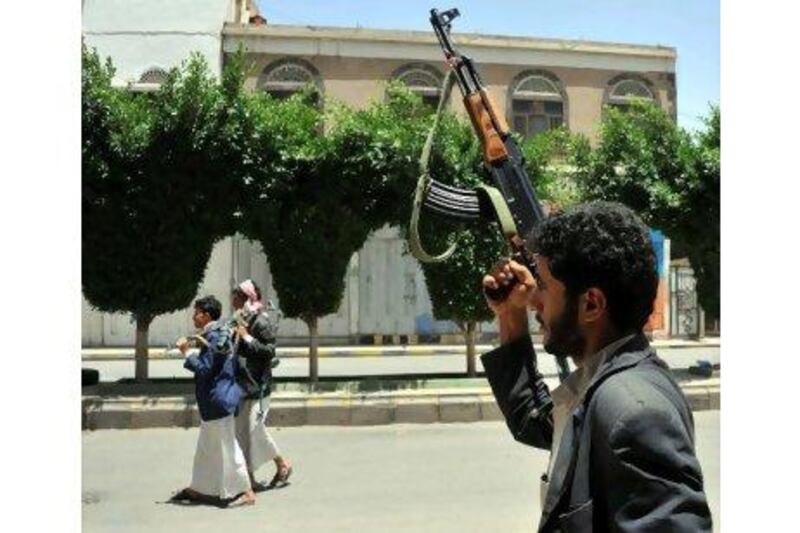SANA'A // With gunfire in the streets and Yemen's president in Saudi Arabia, western diplomats were conducting intensive talks with the government and opposition leaders to discuss how to transfer power and end months of violence.
Meanwhile, Ali Abdullah Saleh continues to indicate that he intends to return to Yemen and assume power once again. Mr Saleh was injured in a rocket attack on Friday and is in Riyadh to receive medical care.
The country's vice-president, Abed Rabbo Mansour Hadi, who is acting leader in the president's absence, said yesterday: "Saleh's health is improving greatly and he will return to the country in the coming days."
Nonetheless, the opposition is eager to establish a post-Saleh transition. US, UK and European Union ambassadors conducted talks yesterday and on Sunday with the leaders of the main opposition, known as the Joint Meeting Parties, and Mr Hadi.
Mohammed Kahtan, a JMP spokesman, said the talks focused on how to achieve a peaceful transfer of power to Mr Hadi in line with the constitution and a Gulf-brokered transition plan.
"We do not have any objection that power is transferred to the vice president according to the constitution and the Gulf plan," Mr Kahtan said. "If the ruling party and the relatives of the president do not accept the GCC plan, the opposition will announce its transitional council."
Another opposition leader, who requested anonymity, said western diplomats underscored the importance of implementing the Gulf Cooperation Council plan that called for Mr Saleh to step down and transfer power to his deputy within 30 days after signing the deal in return for immunity to prosecution for his family and inner circle. It also called for the establishment of a unity government led by the opposition, and a presidential election within 60 days after the power transfer.
The opposition leader said the three western ambassadors said there was no need for Mr Saleh's signature after his departure to Saudi Arabia and that they should move to the next step, which is to transfer power to Mr Hadi.
Mr Saleh refused three times in recent weeks to sign the deal, even though his government and the opposition signed it. Officials in his regime said yesterday that nothing could be done without his approval.
Abdu al Janadi, the deputy information minister, said: "Saleh is still the legitimate president and is on medical treatment only and will come back after he recovers."
There is division among the ruling party leaders. Some approve of establishing a unity government while others object to it, calling such a move a "coup", according to an official who attended the meeting.
Mr Saleh is recuperating in a military hospital in Riyadh after he was wounded in an attack on a mosque in his presidential compound in Sana'a.
Even in his absence, Mr Saleh, 69, still has a powerful presence on the ground. His sons, brothers and nephews command Yemen's strongest military units and remain in the country.
Their forces remained deployed around Sana'a yesterday, locked in a tense standoff with the tribal fighters who rose up two weeks ago to depose Mr Saleh. The fighting rocked the capital, killing dozens, until a ceasefire was brokered by Saudi Arabia's King Abdullah as Mr Saleh left for treatment.
Faris al Saqqaf, director of the Future Studies Centre, said that talking about Mr Saleh's return is meant to ease tensions and prepare for a smooth power transfer.
"The Saleh regime has ended and talking about his return is just meant to diffuse tension and give assurances to his sons and relatives to avoid a mad revenge from their side, which will lead to their end but will cost the country a lot," Mr al Saqqaf said.
"I think the relatives of Saleh, the ruling party and the opposition have no option but to come back to the Gulf plan to get the country out of this power vacuum," Mr Saqqaf said.
The ceasefire between the government forces and Sheikh Sadeq al Ahmar, leader of the most powerful tribal confederation of Hashid, seemed at risk of unravelling yesterday as regime supporters opened fire on opposition fighters in renewed clashes that killed at least six.
Gunmen, apparently pro-Saleh forces, attacked tribal fighters loyal to Sheikh Ahmar yesterday, killing three tribesmen, Sheikh Ahmar's office said. The shooting took place in the Sana'a district of Hasaba, where Sheikh Ahmar's residence is located and that has been the centre of recent fighting. Intermittent gunfire and blasts continued to be heard on Sunday evening.
Late Sunday, pro-government gunmen opened fire on a checkpoint manned by a military unit that defected and joined the opposition, said Munir Farhan, a witness.
Two of the attackers and one of the unit's soldiers were killed in the clashes near the vice president's house.
Hasaba remained tense and closed off yesterday, with government forces dug in despite promises under the cease-fire that they would pull back.
Mr Hadi yesterday chaired a meeting for the country's supreme security committee and discussed efforts to boost a ceasefire and pullout of the tribal fighters from the government buildings, the state news agency reported. He said the government should move to provide basic services to the citizens such as petrol, diesel, cooking gas and power.





